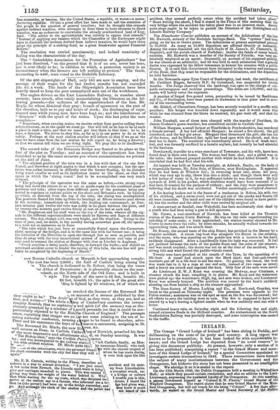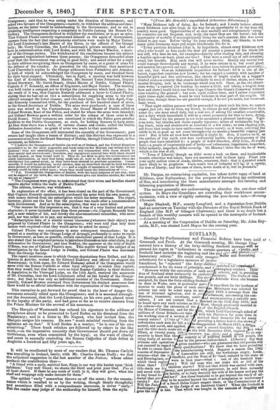IRELAND.
The Orange "Grand Lodge of Ireland" has been sitting in Dublin, and deliberating on the state of its party and country. A long repeat was known to be in preparation; it has been looked for with considerable interest; and the Grand Lodge has departed from "its usual reserve" in giving this document publicity. At present, however, only a section of it has been published; comprising a report "to the Grand Master and members of the Grand Lodge of Ireland," by a special Committee appointed to investigate certain transactions in 1848. Those transactions have formed the subject of many inoriminations between the Government and the Orangemen, but hitherto the story has not been presented in an intelligible shape. We abridge it as it is stated in the report. On the 13th March 1848, the Dublin Orangemen held a meeting in Whitefriare Hall; at which they passed certain resolutions, and also an address to the LordLieutenant, expressing the unabated loyalty of the Orangemen. At this meeting, a person introduced himself sis "Colonel R. W. Phaire," Grand Master of the Wexford Orangemen. The report states that he was Grand Master of the Wexford Orangemen but will not vouch for his being "Colonel." A few days after
wards, lee waited on the Grand Master and Grand Secretary pf I. Dublin _ , _
Orangemen ; said that he was acting under the direction of Government; and asked two favours of the Orangemen,-namely, to withdraw the address and reso
lutions, as the latter would be embarrassing to the Government; and to aid in
obtaining intelligence respecting a conspiracy in Dublin (among the Roman Catholics). The Orangemen declined to withdraw the resolutions, or to act as spies.
That Colonel Phaire correctly represented himself as the agent of Government, appears from the fact that consentaneous overtures were made by Major Turner, the Lord-Lieutenant's late Master of the Horse, to the officers of the Orange
hodyi Mr. Corry Connellan' the Lord-Lieutenant's private secretary, had also
been in communication with Lord Roden, and with Mr. Stewart Blacker, a member of the Orange society. The withdrawal of the resolutions became the subject
or repeated negotiations between these persons: the Orangemen demanded some
proof that the Government was acting in good faith; and asked either for a reply to their address recognizing them as Orangemen by name, or a grant of arms for the defence of the country. As precedent for the recognition, they mentioned Lord Clarendon's replies to the Orange addresses from Portadown and Annahoe, hi both of which he acknowledged the Orangemen by name, and thanked them for their loyal support. Ultimately, late in April, a meeting was held between the Earl of Enniskillen, Grand Master, Mr. Samuel Yates Johnstone, Deputy Grand Secretary, Mr. David Stuart, Grand Master of Dublin, Colonel Phaire, Captain J. P. Kennedy, an officer of Engineers, and Major Turner. The meeting was held under a compact not to divulge the conversation which took place; but the result of it was, that Captain Kennedy addressed a letter to Colonel Phaire, stating that he had set on foot a subscription for supplying arms to the wellaffected amongst the lower classes; and two days later, on the 24th April, Captain Kennedy transmitted 6001, for the purchase of five hundred stand of arms, to the Grand Secretary of Dublin. The arms were purchased; a case of these arms was seized at the Customhouse; the Grand Master of Dublin called on Colonel Browne, head of the Pelice, and stated for whom the arms were intended ; and Colonel Browne gave a written order for the release of those arms to Mr. David Stuart. Other instances are mentioned in which the Police gave peculiar facilities to the Dublin Orangemen, as such, for holding licences to keep arms. At that time there was a body, of various classes and creeds, called the Dublin Defensive Association : no grant of arms was made to that association.
Some of the Orangemen still mistrusted the sincerity of the Government; past events had taught them a lesson of distrust; and this distrust was expressed in a communication from theGrand Secretary of Dublin, through Colonel Phaire, to Government, as follows.
"'1 bditeire the Orangemen of Dublin (as well as of Iceland, and the United Kingdom generally) to be the most peaceable and loyal subjects her Majesty has within her dominions they are exceedingly sensitive, and any transaction with them should be done openly and above-board; therefore, any engagment entered into with them should beheld sacred, as they would hold it. They do not wish to give the Government too %Melt tinlbrmation, as they fear being made use of, cnly to be thrown aside when the emergency has passed away, as they have been treated on previous occasions. Consequently, it would bedidlcious, in my opinion, that an interview should be held between some person or persons on behalf of — and acomile of members of our body, whose secrecy could be fully relied upon ; when they could learn the instructions of —. Provideathe Orangemen of Dublin, with the loyal subjects of our city, turn out in support of the laws, Sec, can the Bovernment,elve our families shelter, &c. whilst we-are so engaged?'
"The Orangemen were given to understand that their wives and families should avceive shelter within the walls of Dublin 'Castle."
The address, however, was withdrawn.
In explanation ef the affair, it.has been-stated on the part of the Government, that Captain Kennedy spontaneously purchased the arms with his own money, or with money derived from the subscription which his letter mentions. The report, however, points out the fact that -the purchase was made after a communication with Government. And as to the -subscriptioe, that was a mere blind.
-"Oar reasons for this impression are, that it was of a very limited and private ,character never.i.ncluded morethae three persons-viz. Captain Kennedy himself, a near relative of his, and thirdly the abovementioned subscriber, who never ,paid, nor was called on to pay, any subscription.
"Subscription-lists of a similar unseal character(whatever their object) were reposed by Colonel Phaire to the sOreagemen.; who were told that only their mimes were required-that they would never be asked for money."
Colonel Phaire was conspicuous in some subsequent transactions: he apSpeared at a meeting -of the Orange Lodge of Armagh, professedly in order to report to-Government, as soon as possible, certain resolutions passed at that Lodge. It is also stated that he employed persons to,introducethemsdives into rebel clubs, to get information for Government; and that Dolrbyn, the approver at the trial of Smith -O'Brien, was one of-Colonel Phaire's men. This-matter formed the subject of an investigation by the Grand Lodge in Dalai, and Colonel Phaire was dismissed from the Orange Society. The 'report mentions eases in which Orange deputations from Belfast, and Ballymena YU Antrim, waited on Sir Edward Blakeney and offered to support the Gererame,iatf in both cases, Sir Edward Blakeney asked if the Orangemen would serve with the Roman Catholic or other loyal subjects: to which they replied, that they would, but that there were no loyal Roman Catholics in their districts. A deputation to the Viceregal Lodge, on the 14th April, received the assurance of Mr. Comelier], that the Lord-Lieutenant relied on the loyalty of the Orangemen; but that he was only an individual member of the Government. Subsequently, Colossi Browne conveyed from Government the distinct assurance that there would be no official interference with the organization of the Orangemen.
This narrative is put forward for proof, that in the hour of danger Government actually relied upon the Orangemen; and it is assumed throughout the document, that the Lord-Lieutenant, on his own part, placed trust in the loyalty of the party, and had gone so far as to receive censure from Lisa Prime Minister for the avowal of his assurance.
The Marquis of Westmeath has refused his signature to the address of condolence about to be presented to Lord Roden on his dismissal from the Magistracy; and in a letter to Mr. Nugent, who had invited him, the Marquis assigns his reasons. He sees " much mischief resulting from the agitation set on foot." If Lord Roden is a martyr, "he is one of his own contriving." These frank rebukes are followed up by others in the like apirit,-on the imperative necessity that Government should put down all turbulence, even when committed by the loyal; on the want of charity and sense in annually reminding the Roman Catholics of their defeat at Aughrim a hundred and fifty years ago, &c.

























 Previous page
Previous page